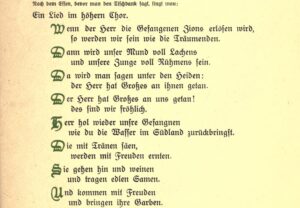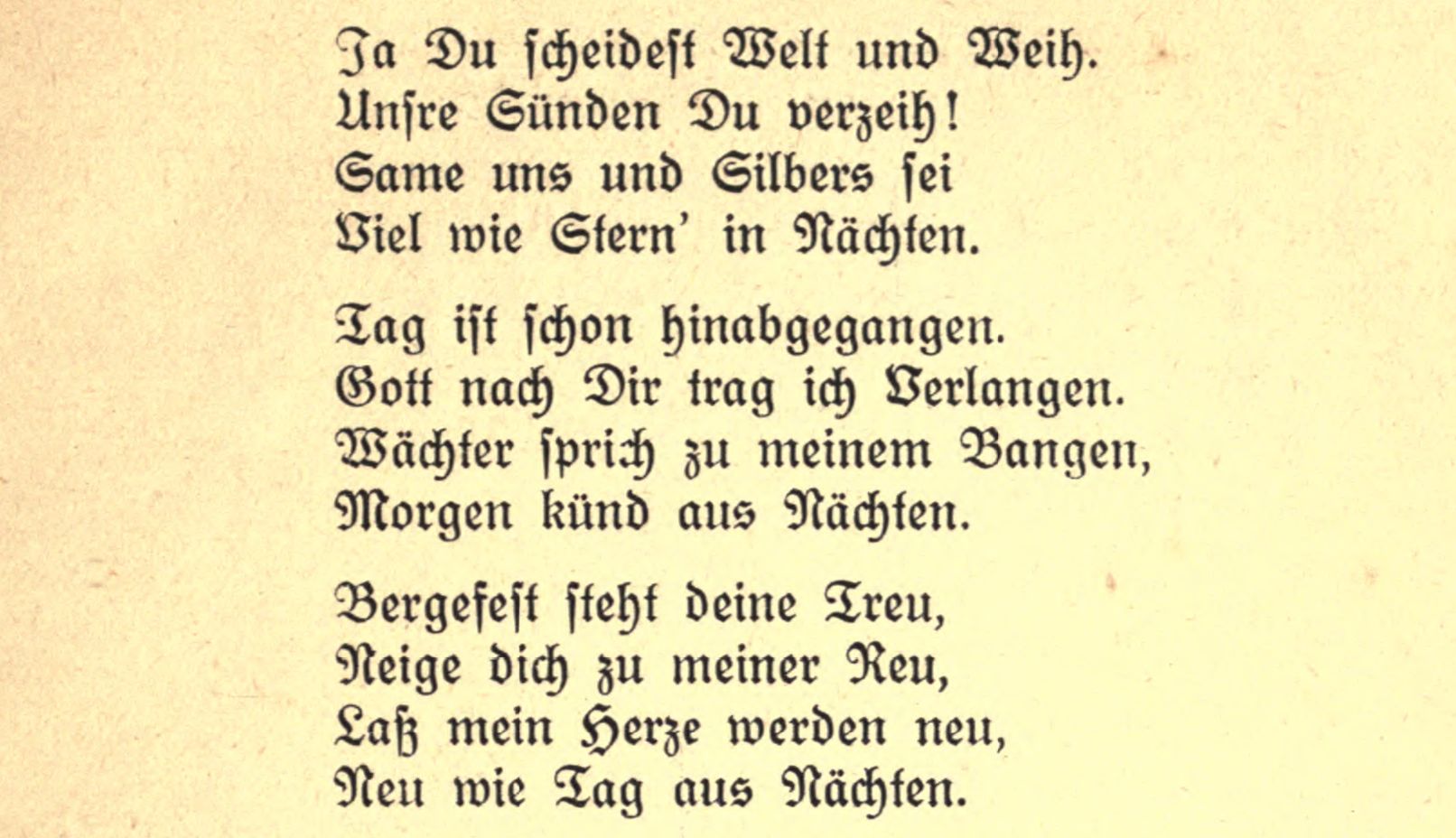| Source (Hebrew) | Translation (German) |
|---|---|
Nach dem Essen, bevor man den Tischdank sagt, singt man: | |
שִׁ֗יר הַֽמַּ֫עֲל֥וֹת |
Ein Lied im höhern Chor. |
בְּשׁ֣וּב יְ֭הֹוָה אֶת־שִׁיבַ֣ת צִיּ֑וֹן הָ֝יִ֗ינוּ כְּחֹלְמִֽים׃ |
Wenn der Herr die Gefangenen Zions erlösen wird, so werden wir sein wie die Träumenden. |
אָ֤ז יִמָּלֵ֪א שְׂח֡וֹק פִּינוּ֮ וּלְשׁוֹנֵ֢נוּ רִ֫נָּ֥ה |
Dann wird unser Mund voll Lachens und unsere Zunge voll Rühmens sein. |
אָ֭ז יֹאמְר֣וּ בַגּוֹיִ֑ם הִגְדִּ֥יל יְ֝הֹוָ֗ה לַעֲשׂ֥וֹת עִם־אֵֽלֶּה׃ |
Da wird man sagen unter den Heiden: der Herr hat Großes an ihnen getan. |
הִגְדִּ֣יל יְ֭הֹוָה לַעֲשׂ֥וֹת עִמָּ֗נוּ הָיִ֥ינוּ שְׂמֵחִֽים׃ |
Der Herr hat Großes an uns getan! des sind wir fröhlich. |
שׁוּבָ֣ה יְ֭הֹוָה אֶת־[שְׁבִיתֵ֑נוּ] (שבותנו) כַּאֲפִיקִ֥ים בַּנֶּֽגֶב׃ |
Herr hol wieder unsre Gefangnen wie du die Wasser im Südland zurückbringst. |
הַזֹּרְעִ֥ים בְּדִמְעָ֗ה בְּרִנָּ֥ה יִקְצֹֽרוּ׃ |
Die mit Tränen säen, werden mit Freuden ernten. |
הָ֘ל֤וֹךְ יֵלֵ֨ךְ ׀ וּבָכֹה֮ נֹשֵׂ֢א מֶשֶׁךְ־הַ֫זָּ֥רַע |
Sie gehen hin und weinen und tragen edlen Samen. |
בֹּא־יָבֹ֥א בְרִנָּ֑ה נֹ֝שֵׂ֗א אֲלֻמֹּתָֽיו׃ |
Und kommen mit Freuden und bringen ihre Garben. |
This is Franz Rosenzweig’s German translation of Psalms 126 (“Shir haMaalot”) as the preface to the Tischdank (Birkat haMazon) on Shabbat. The translation is found in Gabe, Herrn Rabbiner Dr. Nobel zum 50. Geburtstag dargebracht (Frankfurt am Main, 1921), p.101. I have set his translation side-by-side with the Masoretic Hebrew of the shir. –Aharon Varady
Source(s)


“תהלים קכ״ו | Psalms 126 (Shir haMaalot), a German translation by Franz Rosenzweig (1921)” is shared through the Open Siddur Project with a Creative Commons Attribution-ShareAlike 4.0 International copyleft license.










Leave a Reply